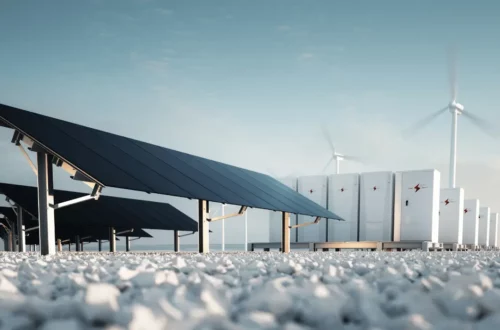How to Use Solar Panels During Power Outage

Solar panels have become increasingly popular as a sustainable energy source, but did you know that they can also provide backup power during emergencies? In this article, we’ll explore the fascinating world of solar panels and how they can help you keep essential appliances running when the electrical grid goes down.
We’ll dive into topics like maximizing the use of solar panels during a blackout, the benefits of using solar power during a power outage, and tips for effectively utilizing solar panels to ensure uninterrupted electricity. Whether it’s steps to utilize solar panels during a power outage or advice on keeping essential appliances powered, we’ve got you covered.
So, if you’re ready to discover how solar panels can be your lifeline during a blackout, keep reading.
Do Solar Panels Work During a Power Outage?
Contrary to a common misconception, solar panels can indeed work during a power outage. However, it’s important to understand the reasons behind their functionality in such situations. Here’s why solar panels are a reliable source of electricity during power outages:
1. Off-Grid Solar Systems
Off-grid solar systems are designed to operate independently from the electrical grid. They consist of solar panels that convert sunlight into electricity, which is then stored in batteries for later use. During a power outage, these systems continue to generate electricity, allowing you to power essential appliances and devices in your home. Off-grid systems are ideal for those living in remote areas or wanting to be self-sufficient.
2. Solar Power Battery Backup Systems
Solar power battery backup systems work by storing excess electricity generated by your solar panels in batteries. This stored energy can be used during power outages, providing a reliable backup power source. These systems are particularly beneficial for homeowners who are connected to the grid but want the added security of backup power when the grid fails. With a battery backup system, you can keep critical appliances running, such as refrigerators, lights, and communication devices.
It’s important to note that the functionality of solar panels during a power outage depends on the availability of sunlight. If the outage lasts for several consecutive days or occurs during inclement weather, the amount of electricity generated by the panels may be limited. Additionally, it’s recommended to consult with a professional solar installer to ensure your system is set up correctly and that it includes the necessary components for backup power.
Remember, the key is to have a properly installed and maintained solar panel system, along with the necessary components for backup power, to maximize the functionality during power outages.
Also read: How Long Does It Take To Install Solar Panels: A Comprehensive 2023 Guide
How to Use Solar Panels During Power Outage
During a power outage, solar panels can be a lifesaver, providing a reliable source of electricity. There are two main methods to effectively utilize solar panels during a power outage: Off-Grid Solar Systems and Solar Power Battery Backup Systems. Let’s explore these methods and understand their functionality and advantages.
Off-Grid Solar Systems
Off-grid solar systems are designed to operate independently of the electrical grid. They consist of solar panels, charge controllers, batteries, and inverters. Here’s how they work:
1. Solar Panels: The solar panels capture sunlight and convert it into direct current (DC) electricity.
2. Charge Controllers: Charge controllers regulate the flow of electricity from the solar panels to the batteries and prevent overcharging.
3. Batteries: The batteries store the excess electricity generated by the solar panels.
4. Inverters: Inverters convert the stored DC electricity from the batteries into usable alternating current (AC) electricity, which can power your essential appliances during a power outage.
Advantages of Off-Grid Solar Systems:
– Independence from the electrical grid: Off-grid solar systems ensure uninterrupted power supply even when the grid is down.
– Self-sufficiency: With an off-grid solar system, you can generate your own electricity, reducing reliance on the utility company.
– Environmental friendliness: Off-grid solar systems harness clean, renewable energy, reducing your carbon footprint.
Solar Power Battery Backup Systems
Solar power battery backup systems combine the benefits of grid-connected solar panels with battery storage. These systems allow you to store excess electricity generated during sunny periods and use it when the grid is down. Here’s how they work:
1. Solar Panels: The solar panels generate electricity from sunlight, which is fed into the electrical grid.
2. Grid-Tied Inverters: Grid-tied inverters convert the DC electricity from the solar panels into usable AC electricity for your home appliances.
3. Bidirectional Meter: The bidirectional meter measures the electricity you consume from the grid and the excess electricity you feed back into the grid.
4. Battery Backup System: The battery backup system stores the excess electricity for later use during a power outage.
5. During a Power Outage: When the power goes out, a transfer switch disconnects your home from the grid, and the battery backup system powers your essential appliances using the stored energy.
Advantages of Solar Power Battery Backup Systems:
– Seamless transition: During a power outage, these systems provide a smooth and uninterrupted supply of electricity.
– Increased self-consumption: You can maximize the utilization of the solar energy you generate by storing excess electricity for later use.
– Reduced electricity bills: By using stored energy during peak demand periods, you can avoid higher time-of-use rates.
By utilizing either off-grid solar systems or solar power battery backup systems, you can ensure uninterrupted power supply during a power outage. These systems not only provide convenience and self-sufficiency but also contribute to a greener and more sustainable future.
Remember, when considering these options, consult with a professional solar system installation expert to design a system tailored to your specific needs and to ensure its compatibility with power safety measures and regulations.
Also read: Can You Put Solar Panels On A Metal Roof?
Why Do I Need a Portable Solar Generator During a Power Outage?
When faced with a power outage, having a portable solar generator can be incredibly beneficial. Here are a few reasons why you should consider having one:
Versatility and Portability
A portable solar generator provides you with the flexibility to generate electricity wherever you need it. Unlike traditional generators that rely on fossil fuels, solar generators harness the sun’s energy to create power. This means you won’t have to worry about constantly refueling or being limited to a fixed location. Whether you’re at home, camping, or on a family trip, a portable solar generator can provide you with the power you need.
Reliable Source of Energy
During a power outage, the electrical grid may fail, leaving you without access to electricity. A portable solar generator ensures that you have a reliable backup source of energy. By converting sunlight into electricity, solar generators can keep your essential appliances running, such as lights, refrigerators, and communication devices. This ensures that you and your family are not left in the dark during emergencies.
One of the major advantages of using a portable solar generator is its eco-friendliness. Solar generators produce clean energy without emitting harmful pollutants or greenhouse gases. By utilizing the sun’s abundant resources, you contribute to reducing carbon emissions and minimizing your carbon footprint. This makes a portable solar generator a sustainable and responsible choice for powering your home during a power outage.
Cost Savings
While the initial cost of a portable solar generator may be higher compared to traditional generators, it can lead to significant long-term savings. Solar energy is free, so you won’t have to spend money on fuel or worry about rising fuel costs. Additionally, some regions offer incentives, such as tax credits and rebates, for installing solar-powered devices. Over time, the cost of a portable solar generator can be offset by the savings on utility bills and potential incentives.
Also read: How Hot do Solar Panels Get
Wrapping Up
Utilizing solar panels during a power outage can be a game-changer in ensuring uninterrupted electricity supply. By harnessing the power of the sun, you can keep your essential appliances running even when the grid is down. Here are the key points to remember:
1. Reliable Alternative: Solar panels offer a reliable alternative source of energy during power outages. They are not dependent on the electrical grid and can continue generating electricity as long as there is sunlight.
2. Off-Grid and Battery Backup Options: There are two main methods to use solar panels during a power outage – Off-grid solar systems and solar power battery backup systems. Off-grid systems allow you to be completely independent from the grid, while battery backup systems store excess energy for later use.
3. Portable Solar Generators: Investing in a portable solar generator can provide additional flexibility and versatility during power outages. These generators can be easily moved and provide a convenient source of power for camping or emergencies.
In times of extreme weather events or grid failures, solar panels can offer a cost-effective and sustainable solution for maintaining power supply. Consider the capacity of your solar system, battery backup options, and proper maintenance to maximize the benefits of solar energy during power outages. Stay prepared and enjoy the benefits of clean and uninterrupted electricity with solar panels.
Also read: Solar Panels for Tiny House Living: Everything You Need to Know
Remember, solar energy is not only a smart choice for the environment but also for ensuring power safety during uncertain times.





![Unlocking the Future: 6 Sustainable Energy Sources Revolutionizing Our World [Expert Guide]](https://greenifyhub.com/wp-content/uploads/2024/08/Unlocking-the-Future-6-Sustainable-Energy-Sources-Revolutionizing-Our-World-Expert-Guide-500x330.webp)